- Home
- Site Index
- About Me
-
My Books
- Book List & Themes
- Strictly for Adults Novels >
-
Tales from Portlaw
>
- No Need to Look for Love
- 'The Love Quartet' >
-
The Priest's Calling Card
>
- Chapter One - The Irish Custom
- Chapter Two - Patrick Duffy's Family Background
- Chapter Three - Patrick Duffy Junior's Vocation to Priesthood
- Chapter Four - The first years of the priesthood
- Chapter Five - Father Patrick Duffy in Seattle
- Chapter Six - Father Patrick Duffy, Portlaw Priest
- Chapter Seven - Patrick Duffy Priest Power
- Chapter Eight - Patrick Duffy Groundless Gossip
- Chapter Nine - Monsignor Duffy of Portlaw
- Chapter Ten - The Portlaw Inheritance of Patrick Duffy
- Bigger and Better >
- The Oldest Woman in the World >
-
Sean and Sarah
>
- Chapter 1 - 'Return of the Prodigal Son'
- Chapter 2 - 'The early years of sweet innocence in Portlaw'
- Chapter 3 - 'The Separation'
- Chapter 4 - 'Separation and Betrayal'
- Chapter 5 - 'Portlaw to Manchester'
- Chapter 6 - 'Salford Choices'
- Chapter 7 - 'Life inside Prison'
- Chapter 8 - 'The Aylesbury Pilgrimage'
- Chapter 9 - Sean's interest in stone masonary'
- Chapter 10 - 'Sean's and Tony's Partnership'
- Chapter 11 - 'Return of the Prodigal Son'
- The Alternative Christmas Party >
-
The Life of Liam Lafferty
>
- Chapter One: ' Liam Lafferty is born'
- Chapter Two : 'The Baptism of Liam Lafferty'
- Chapter Three: 'The early years of Liam Lafferty'
- Chapter Four : Early Manhood
- Chapter Five : Ned's Secret Past
- Chapter Six : Courtship and Marriage
- Chapter Seven : Liam and Trish marry
- Chapter Eight : Farley meets Ned
- Chapter Nine : 'Ned comes clean to Farley'
- Chapter Ten : Tragedy hits the family
- Chapter Eleven : The future is brighter
-
The life and times of Joe Walsh
>
- Chapter One : 'The marriage of Margaret Mawd and Thomas Walsh’
- Chapter Two 'The birth of Joe Walsh'
- Chapter Three 'Marriage breakup and betrayal'
- Chapter Four: ' The Walsh family breakup'
- Chapter Five : ' Liverpool Lodgings'
- Chapter Six: ' Settled times are established and tested'
- Chapter Seven : 'Haworth is heaven is a place on earth'
- Chapter Eight: 'Coming out'
- Chapter Nine: Portlaw revenge
- Chapter Ten: ' The murder trial of Paddy Groggy'
- Chapter Eleven: 'New beginnings'
-
The Woman Who Hated Christmas
>
- Chapter One: 'The Christmas Enigma'
- Chapter Two: ' The Breakup of Beth's Family''
- Chapter Three: From Teenager to Adulthood.'
- Chapter Four: 'The Mills of West Yorkshire.'
- Chapter Five: 'Harrison Garner Showdown.'
- Chapter Six : 'The Christmas Dance'
- Chapter Seven : 'The ballot for Shop Steward.'
- Chapter Eight: ' Leaving the Mill'
- Chapter Ten: ' Beth buries her Ghosts'
- Chapter Eleven: Beth and Dermot start off married life in Galway.
- Chapter Twelve: The Twin Tragedy of Christmas, 1992.'
- Chapter Thirteen: 'The Christmas star returns'
- Chapter Fourteen: ' Beth's future in Portlaw'
-
The Last Dance
>
- Chapter One - ‘Nancy Swales becomes the Widow Swales’
- Chapter Two ‘The secret night life of Widow Swales’
- Chapter Three ‘Meeting Richard again’
- Chapter Four ‘Clancy’s Ballroom: March 1961’
- Chapter Five ‘The All Ireland Dancing Rounds’
- Chapter Six ‘James Mountford’
- Chapter Seven ‘The All Ireland Ballroom Latin American Dance Final.’
- Chapter Eight ‘The Final Arrives’
- Chapter Nine: 'Beth in Manchester.'
- 'Two Sisters' >
- Fourteen Days >
-
‘The Postman Always Knocks Twice’
>
- Author's Foreword
- Contents
- Chapter One
- Chapter Two
- Chapter Three
- Chapter Four
- Chapter Five
- Chapter Six
- Chapter Seven
- Chapter Eight
- Chapter Nine
- Chapter Ten
- Chapter Eleven
- Chapter Twelve
- Chapter Thirteen
- Chapter Fourteen
- Chapter Fifteen
- Chapter Sixteen
- Chapter Seventeen
- Chapter Eighteen
- Chapter Nineteen
- Chapter Twenty
- Chapter Twenty-One
- Chapter Twenty-Two
-
Celebrity Contacts
-
Thoughts and Musings
- Bereavement >
- Nature >
-
Bill's Personal Development
>
- What I'd like to be remembered for
- Second Chances
- Roots
- Holidays of Old
- Memorable Moments of Mine
- Cleckheaton Consecration
- Canadian Loves
- Mum's Wisdom
- 'Early life at my Grandparents'
- Family Holidays
- 'Mother /Child Bond'
- Childhood Pain
- The Death of Lady
- 'Soldiering On'
- 'Romantic Holidays'
- 'On the roof'
- Always wear clean shoes
- 'Family Tree'
- The importance of poise
- 'Growing up with grandparents'
- Love & Romance >
- Christian Thoughts, Acts and Words >
- My Wedding
- My Funeral
- Audio Downloads
- My Singing Videos
- Bill's Blog
- Contact Me
Chapter Seven
'Haworth is heaven is a place on earth'

Their choice of place to start again as a family was selected by Margaret as being in West Yorkshire. As a growing child, Margaret remembered West Yorkshire having been depicted as a place where the life was hard, but so reportedly were its down-to-earth people.

It was reputed to be a place of picturesque beauty with the Dales and the Peak District on its doorstep, along with an expanse of moorland around it that couldn’t be matched for its wild beauty and rugged landscape.
The city centre of Bradford was said to be able to provide gainful employment for anyone willing to do a fair day's work for a fair day's pay. Over the years as its population had grown, it became stuffed with factories and textile mills and yet, but ten miles out of the city towards Keighley and Skipton, the closeness of those dark dwellings cloaked with centuries of industrial soot and grime was exchanged for open fields and hill-top ranges which offered fresh air and countryside in abundance to the enthralled traveller.
The city centre of Bradford was said to be able to provide gainful employment for anyone willing to do a fair day's work for a fair day's pay. Over the years as its population had grown, it became stuffed with factories and textile mills and yet, but ten miles out of the city towards Keighley and Skipton, the closeness of those dark dwellings cloaked with centuries of industrial soot and grime was exchanged for open fields and hill-top ranges which offered fresh air and countryside in abundance to the enthralled traveller.

The Dransfield family quickly settled into the picturesque village of Haworth with its cobbled Main Street filled with quaint shops that catered for all manner of tourists and locals, many of whom came from as far afield as Japan. The contrast of this tourist place was sometimes difficult to take in. During busy months of the year, tourists would flock in their thousands, making it impossible for any local to walk its Main Street without bumping into numerous strange dialects and languages.
To walk down the Main Street on an early morning out of season however, and to see its cobbles empty and ever so quiet was like being in another world. Margaret loved to look at the 18th and 19th century properties on either side which appeared to stand to attention as she passed by, reverently curtsying their bowed rooftop ridges which had withstood inclement weather for hundreds of years without complaint. As Margaret walked this holy ground where once had trod the footsteps of three famous sisters, she considered the literary merit that Yorkshire had provided during its lifetime.
To walk down the Main Street on an early morning out of season however, and to see its cobbles empty and ever so quiet was like being in another world. Margaret loved to look at the 18th and 19th century properties on either side which appeared to stand to attention as she passed by, reverently curtsying their bowed rooftop ridges which had withstood inclement weather for hundreds of years without complaint. As Margaret walked this holy ground where once had trod the footsteps of three famous sisters, she considered the literary merit that Yorkshire had provided during its lifetime.
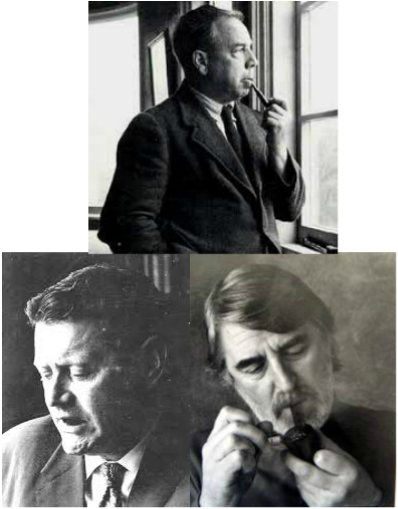
West Yorkshire had always been a county steeped in its own working-class history, traditions and culture, all of which had witnessed the rise of trade unionism and capital rebellion against the power of the Masters for centuries. Over the previous two hundred years, the Industrial Revolution had compelled its working class people to change their manner of work from the fields and farms to the factories and mills of engineering, steel and textiles.
The farm labourer had long since been provided with a new way of life. Instead of working in the open air planting crops, harvesting wheat, ploughing fields, stacking hay and picking potatoes from the land above ground as they'd done for centuries, they now learned to break sweat stoking the white-hot furnaces of steel and engineering works or wielding pick axes and shovels in the dangerously confined places of pit shafts half-a-mile below ground for twelve hours a day, as they struggled to break the ground asunder and extract from its bowels, the black gold called coal.
Many others found labour in the textile and shoddy mills, which were still producing cloth to export from the once textile capitals of the world, Yorkshire and its neighbour Lancashire.
West Yorkshire had always spawned great writers; some of world renown. The author and playwright J.B. Priestley originated from the Bradford area. Margaret had studied a few of his plays at university. Since the 1950s, a group of angry writers had emerged on the British literary scene. Each of these authors selected as the chief characters in their acclaimed novels, working-class heroes and heroines who lived in the working-class conditions they were acquainted with. Chief among this group of ‘angry young men’ was John Braine who penned ‘Room at the Top’ in 1957, which soon after was made into a successful film. He had been born in Bingley, West Yorkshire. Shortly after, author Stan Barstow from Wakefield, West Yorkshire also set the literary world alight in 1960 with his working class novel of ‘A kind of loving,’ another acclaimed work that was turned into a highly successful film.
The farm labourer had long since been provided with a new way of life. Instead of working in the open air planting crops, harvesting wheat, ploughing fields, stacking hay and picking potatoes from the land above ground as they'd done for centuries, they now learned to break sweat stoking the white-hot furnaces of steel and engineering works or wielding pick axes and shovels in the dangerously confined places of pit shafts half-a-mile below ground for twelve hours a day, as they struggled to break the ground asunder and extract from its bowels, the black gold called coal.
Many others found labour in the textile and shoddy mills, which were still producing cloth to export from the once textile capitals of the world, Yorkshire and its neighbour Lancashire.
West Yorkshire had always spawned great writers; some of world renown. The author and playwright J.B. Priestley originated from the Bradford area. Margaret had studied a few of his plays at university. Since the 1950s, a group of angry writers had emerged on the British literary scene. Each of these authors selected as the chief characters in their acclaimed novels, working-class heroes and heroines who lived in the working-class conditions they were acquainted with. Chief among this group of ‘angry young men’ was John Braine who penned ‘Room at the Top’ in 1957, which soon after was made into a successful film. He had been born in Bingley, West Yorkshire. Shortly after, author Stan Barstow from Wakefield, West Yorkshire also set the literary world alight in 1960 with his working class novel of ‘A kind of loving,’ another acclaimed work that was turned into a highly successful film.
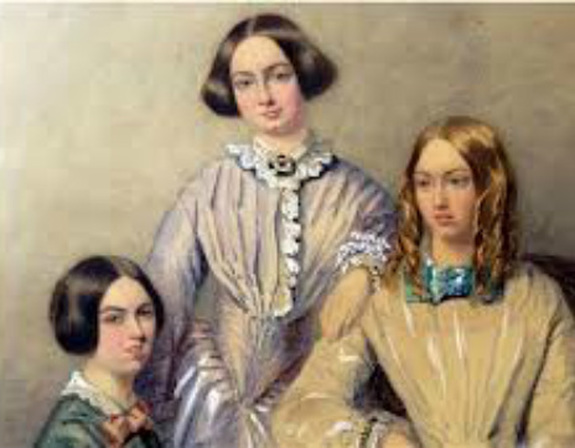
None of these West Yorkshire writers however, could touch the works of the famous Bronte sisters, Anne, Emily and Charlotte who were part of a nineteenth-century literary family reared in the vicarage in Haworth, West Yorkshire. Margaret had taken these three rebel writers to her heart while at university; not only for the classical novels they wrote and which became accepted as masterpieces of literature such as ‘Jane Eyre’, ‘Wuthering Heights’ and ‘The Tenant of Wildfell Hall’, but because they were all women who eventually made it in a man’s world! Admittedly, in accordance with the practices of their times, in order to ensure that their works were read at all to begin with, they each originally published their poems and novels under masculine pseudonyms.
All of these authors who had inspired Margaret over so many years had been born within a ten-mile radius of Bradford in West Yorkshire. So with a passion for literature in her soul once more, Margaret persuaded Tom to come to Haworth Village, in Keighley, West Yorkshire where the couple bought a stone cottage in West Lane with four rooms that overlooked the Bronte Parsonage from their bedroom window.
All of these authors who had inspired Margaret over so many years had been born within a ten-mile radius of Bradford in West Yorkshire. So with a passion for literature in her soul once more, Margaret persuaded Tom to come to Haworth Village, in Keighley, West Yorkshire where the couple bought a stone cottage in West Lane with four rooms that overlooked the Bronte Parsonage from their bedroom window.
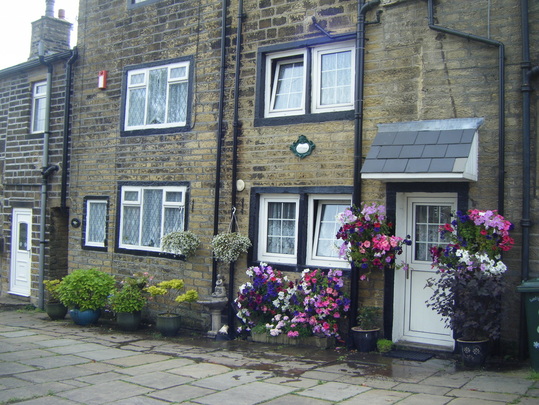
Tom and Margaret had decided to downsize to a smaller place as this would allow them to buy the cottage they liked in West Lane, Haworth, outright. They intended to apply for permission to rent out two of the four rooms to tourists who frequented the village every spring, summer and autumn. Along with Stratford upon Avon and the City of York, Haworth was culturally one of the three most visited places in England for tourists to come all-year-round.
With no mortgage to pay and only outgoings for the family to cater for, Margaret, Tom and Joe would be able to get by with Margaret only needing a part-time job. She could then get down to some serious writing as she'd had the idea for a good novel inside her for ages that was simply itching to be written.
With no mortgage to pay and only outgoings for the family to cater for, Margaret, Tom and Joe would be able to get by with Margaret only needing a part-time job. She could then get down to some serious writing as she'd had the idea for a good novel inside her for ages that was simply itching to be written.
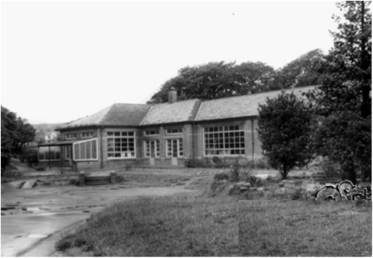
Joe was enrolled at a school in nearby Oakworth where she seemed to settle in without too much difficulty. Margaret discovered that she had a knack for making jam that tasted tiptop and it wasn’t too long before she was supplying about twenty Haworth customers weekly on the quiet.
Margaret was initially unable to take advantage of her educational qualifications and librarian experience by getting a part-time post in a library. She could have secured a full-time post as a librarian in Keighley, but such hours would have not provided her with the time she wanted to spend writing daily.
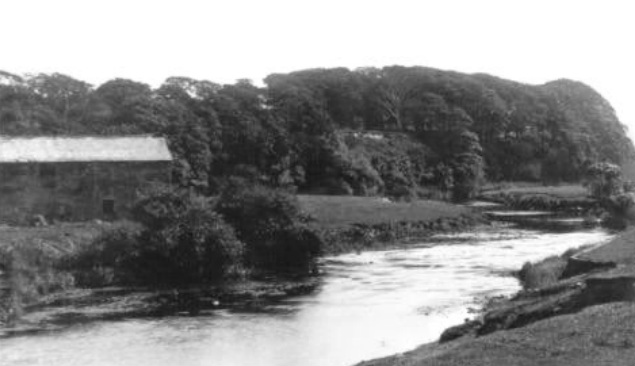
Having always been fascinated by the mill workers of Yorkshire and Lancashire, Margaret decided to obtain a part-time job in a local mill in Keighley as a yarn worker. The work was hectic and there was no slacking allowed between the starting and ending of one’s shift, but the wages earned were needed and the hours worked fitted her needs nicely.
Besides, the women Margaret worked alongside were a good laugh. They were down-to–earth working-class characters about whom she wanted to write at a future date. They all had experienced hard existences in order to get by and make ends meet, but in a strange way which Margaret greatly admired, they made the best of their lot and would go to any lengths to defend their work mates and their personal integrity.
While Margaret’s correct diction in her speech and obvious level of intelligence instantly made her stand out as being different from the other women she worked alongside, none of her mill colleagues thought her either snobbish or too snooty. Although proud, Margaret had never been full of a disproportionate sense of her own importance and carried no airs and graces into the mill with her each day she clocked in. Margaret wasn’t the type to put another down and would instantly frown upon anyone who did.
While most of her work colleagues were surprised to eventually learn that Margaret had obtained a university degree as a young woman, not one of them held it against her as she feared they might have. Over time, as they got to know more about their well-spoken work mate and learned of her ambitions to write a book that would get published, every single one of them spurred her on to success.
“If anyone can do it lass, tha’ can,” was the common consensus often expressed. "Don't forget us when tha' rich and famous, will tha'?" and "However rich and famous tha' might get, your shit will always stink the same as ours!" were a few of the often repeated jibes that Margaret would have to contend with.
Margaret stayed in her textile job for just short of three years and was in many ways sorry to leave it when she eventually decided it was time to go. A change in domestic circumstances meant that she needed to be home throughout the whole of the day during the immediate future.
Most of Margaret’s textile colleagues simply thought that she was now better placed to give up her part-time job, enabling her to devote all her time to her writing now that her 15 year-old-daughter Joe was taking her examinations. Margaret had often spoken of her daughter Joe with pride and had every expectation that Joe would hopefully pass her 'A' Levels and attend university eventually.
Besides, the women Margaret worked alongside were a good laugh. They were down-to–earth working-class characters about whom she wanted to write at a future date. They all had experienced hard existences in order to get by and make ends meet, but in a strange way which Margaret greatly admired, they made the best of their lot and would go to any lengths to defend their work mates and their personal integrity.
While Margaret’s correct diction in her speech and obvious level of intelligence instantly made her stand out as being different from the other women she worked alongside, none of her mill colleagues thought her either snobbish or too snooty. Although proud, Margaret had never been full of a disproportionate sense of her own importance and carried no airs and graces into the mill with her each day she clocked in. Margaret wasn’t the type to put another down and would instantly frown upon anyone who did.
While most of her work colleagues were surprised to eventually learn that Margaret had obtained a university degree as a young woman, not one of them held it against her as she feared they might have. Over time, as they got to know more about their well-spoken work mate and learned of her ambitions to write a book that would get published, every single one of them spurred her on to success.
“If anyone can do it lass, tha’ can,” was the common consensus often expressed. "Don't forget us when tha' rich and famous, will tha'?" and "However rich and famous tha' might get, your shit will always stink the same as ours!" were a few of the often repeated jibes that Margaret would have to contend with.
Margaret stayed in her textile job for just short of three years and was in many ways sorry to leave it when she eventually decided it was time to go. A change in domestic circumstances meant that she needed to be home throughout the whole of the day during the immediate future.
Most of Margaret’s textile colleagues simply thought that she was now better placed to give up her part-time job, enabling her to devote all her time to her writing now that her 15 year-old-daughter Joe was taking her examinations. Margaret had often spoken of her daughter Joe with pride and had every expectation that Joe would hopefully pass her 'A' Levels and attend university eventually.
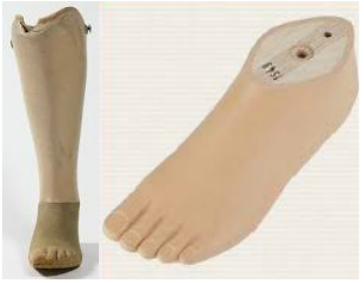
However, Margaret had other reasons for being home on a full-time basis now; especially during the height of the tourist months when there would always be a couple of room guests to deal with.
For a number of months, Tom had been experiencing difficulty with his prosthesis. He had been seen by a specialist from Harrogate in that field and was to be fitted with a new prosthesis in the not too distant future. His new prosthesis was called a SACH (Solid Ankle Cushion Heel). It had been recently introduced in 1960 and was an ideal component for lower limb prostheses; especially those that required an artificial foot. Its stated benefits were that amputees experienced significantly less irritation of the residual limb with the SACH foot, especially those persons with below-knee amputations. Comfort was reported to be significantly increased because of the cushioned heel and smooth rocker action.
While the new model was most certainly an upgrade to the one he’d worn for many years now, Tom had been informed that it would require learning how best to walk on it and would take a number of months to bed in properly. Hence, Tom would need to both rest and practice walking with his new false leg. When he wasn’t practising he should be resting and vice versa. Nowhere in his programme of activity did this period of readjustment allow for him working in the boarding house.
Naturally, Margaret was pleased that Tom was being fitted with a new leg which was guaranteed to be more versatile than the one he was exchanging. Since they’d known each other, Tom had never once failed to support her and Joe. Now was payback time while he readjusted to his new prosthesis. Her writing would be put on hold until Tom was ready to resume his normal role within their family home.
For a number of months, Tom had been experiencing difficulty with his prosthesis. He had been seen by a specialist from Harrogate in that field and was to be fitted with a new prosthesis in the not too distant future. His new prosthesis was called a SACH (Solid Ankle Cushion Heel). It had been recently introduced in 1960 and was an ideal component for lower limb prostheses; especially those that required an artificial foot. Its stated benefits were that amputees experienced significantly less irritation of the residual limb with the SACH foot, especially those persons with below-knee amputations. Comfort was reported to be significantly increased because of the cushioned heel and smooth rocker action.
While the new model was most certainly an upgrade to the one he’d worn for many years now, Tom had been informed that it would require learning how best to walk on it and would take a number of months to bed in properly. Hence, Tom would need to both rest and practice walking with his new false leg. When he wasn’t practising he should be resting and vice versa. Nowhere in his programme of activity did this period of readjustment allow for him working in the boarding house.
Naturally, Margaret was pleased that Tom was being fitted with a new leg which was guaranteed to be more versatile than the one he was exchanging. Since they’d known each other, Tom had never once failed to support her and Joe. Now was payback time while he readjusted to his new prosthesis. Her writing would be put on hold until Tom was ready to resume his normal role within their family home.
XXXXX
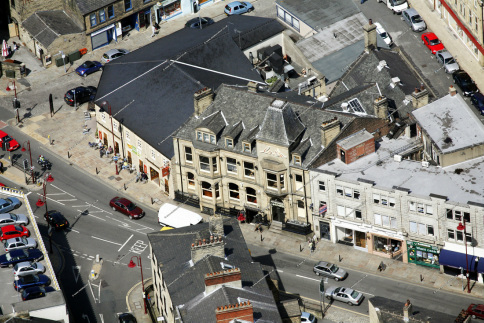
All went well in the Dransfield household over the next two years. Tom's prosthesis exchange was certainly an improvement on his old one and Margaret was half way through writing a new novel as well as regularly submitting her short stories to a number of magazines.
Joe had done well in her mock school exams and was preparing to sit four 'A' Levels for university entrance.
In respect of the quality of relationship experienced between Margaret and Tom, things couldn't have been better and this period in the Dransfield household represented the happiest time the family had ever known, both individually and collectively.
One weekend during a Saturday visit to the Piece Hall in nearby Halifax, Margaret was at a stall when suddenly she went as white as a ghost. Standing across from her, about twenty feet away, was her husband Thomas Walsh. He was buying something from one of the stalls and standing beside him were two children aged around 8 and 9 years; a girl and a boy. Beside the children, a blond-haired woman came into view as she took hold of the girl’s hand.
Margaret was stunned to see Thomas in England, mere yards away from her. She hurriedly turned and concealed the side of her face with a magazine that she carried; walking away as swiftly as she could without drawing unnecessary attention to herself. She was still breathing rapidly as she boarded the next bus back to Haworth. Of all the people she might have seen that day, and at a time in her life when she’d never been happier, who should she clap eyes on, but the one person she never thought she’d ever see again; the one person she never wanted to see again and who could ruin everything for her, Thomas Walsh!
Joe had done well in her mock school exams and was preparing to sit four 'A' Levels for university entrance.
In respect of the quality of relationship experienced between Margaret and Tom, things couldn't have been better and this period in the Dransfield household represented the happiest time the family had ever known, both individually and collectively.
One weekend during a Saturday visit to the Piece Hall in nearby Halifax, Margaret was at a stall when suddenly she went as white as a ghost. Standing across from her, about twenty feet away, was her husband Thomas Walsh. He was buying something from one of the stalls and standing beside him were two children aged around 8 and 9 years; a girl and a boy. Beside the children, a blond-haired woman came into view as she took hold of the girl’s hand.
Margaret was stunned to see Thomas in England, mere yards away from her. She hurriedly turned and concealed the side of her face with a magazine that she carried; walking away as swiftly as she could without drawing unnecessary attention to herself. She was still breathing rapidly as she boarded the next bus back to Haworth. Of all the people she might have seen that day, and at a time in her life when she’d never been happier, who should she clap eyes on, but the one person she never thought she’d ever see again; the one person she never wanted to see again and who could ruin everything for her, Thomas Walsh!
|
Click here for the next page
|
Click here for the previous page
|
